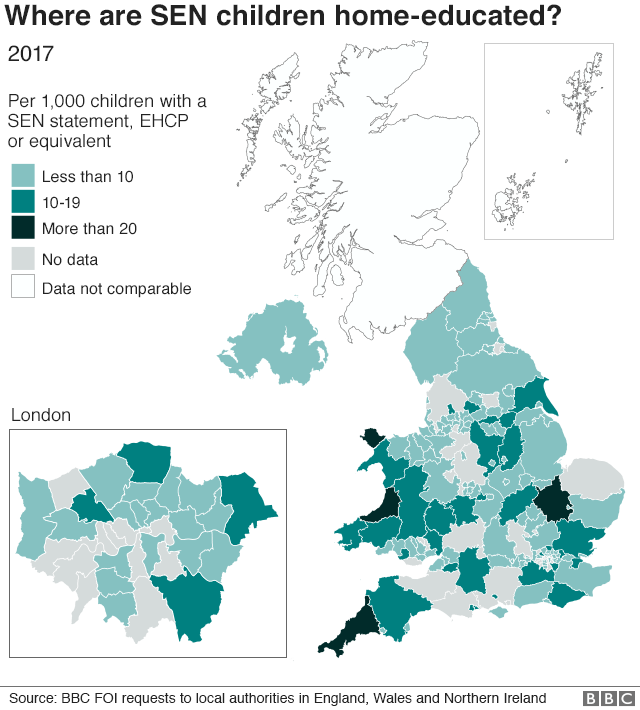Horrendous meltdowns: Why I home-educate my daughter
- Published
Lorna Lynch has decided to home-educate her daughter Emily who has a form of autism
Lorna Lynch is one of a growing number of parents home-educating a child with special needs.
In the last five years, their numbers have grown by 57% across England, Wales and Northern Ireland.
Almost a thousand children with recognised needs are waiting for a school place.
Ministers in England say they're investing to improve the system.
For the past year, 11-year-old Emily has been educated at home, with extra educational activities arranged by her mother Lorna.
Emily has been diagnosed with autism, external and ADHD, external, and is now on medication to manage anxiety.
Home-schooling was a decision Lorna Lynch reached reluctantly after her daughter struggled to understand both lessons and other children's behaviour.
"I couldn't cope with her going to school and then coming back with her so stressed out, so angry at me."
Emily found school confusing and overwhelming.
"I want to learn things that I'm interested in - but it's like I can't learn anything because I don't know how and they don't tell me how."
She would become angry and lash out at other children.
"The meltdowns were horrendous," says Lorna, who tried three different schools before deciding to home-educate.
'Too little support'
While she now feels it is the right decision, she also thinks if more support had been available, it is a step she would not have had to take.
Lorna is currently appealing against a decision to refuse Emily an Education and Health Care Plan which is the official recognition of special needs.

An investigation by BBC Breakfast suggests her case is part of a growing trend.
Across England, Wales and Northern Ireland, 106 councils were able to provide information stretching back five years.
It revealed a 57% increase in children with a statement, or equivalent, being educated at home.
There has also been a rise in the number of children with recognised needs, but without a school place.
Almost 1,000 children with this highest level of special needs are waiting for a place.
Dr Adam Boddison, the chief executive of the special needs charity Nasen,, external said schools are finding it hard to remain inclusive because of performance measures and pressure on their budgets.
"If word gets round that a school is meeting needs, it becomes a magnet.
"The school is overwhelmed, they can't meet the needs.
"All schools are judged on the same criteria.
"So some are very inclusive, others are not."

The data revealed by the BBC investigation is part of a trend that he has noticed with one important change.
"Now too many families don't think they have another option, and have to resort to home education, and that can't be right."
Cash boost for pupils with special needs and disability
The children in care left without a school place
Special needs pupils lack crucial support, poll suggests
In England, where the increase in home education is highest, at 64% over the last five years, the government said it is creating more places at special schools, and is spending £222m over four years on reforms of special educational needs and disability support.
Children and Families Minister Robert Goodwill said: "We recognise the importance of ensuring that schools have the necessary resources to meet a wide range of special educational needs."
Mr Goodwill pointed out that all schools have a duty to admit children with special educational needs and are eligible for local authority top-up funding to provide additional support.